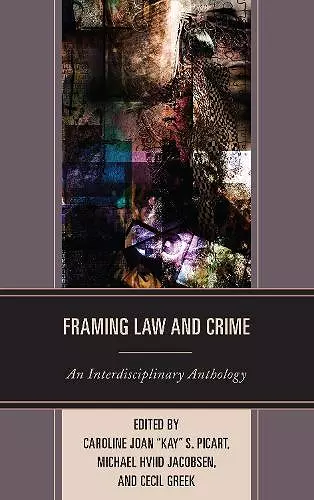Framing Law and Crime
An Interdisciplinary Anthology
Michael Hviid Jacobsen editor Caroline Joan "Kay" S Picart editor Cecil Greek editor
Format:Paperback
Publisher:Fairleigh Dickinson University Press
Published:24th May '18
Currently unavailable, and unfortunately no date known when it will be back
This paperback is available in another edition too:
- Hardback£110.00(9781611477054)

This cutting-edge edited collection brings together 17 scholarly essays on two of cinema and television’s most enduring and powerful themes: law and crime. With contributions by many of the most prominent scholars in law, sociology, criminology, and film, Framing Law and Crime offers a critical survey of a variety of genres and media, integrating descriptions of technique with critical analysis, and incorporating historical and socio-political critique. The first set of essays brings together accounts of the history of the Law and Cinema Movement; the groundbreaking genre of “post-apocalyptic fiction;” and the policy-setting genesis of a Canadian documentary. The second section of the book turns to the examination of a range of international or global films, with an eye to assessing the strengths, frailties, and possible functions of law, as depicted in fictional cinema. After an international focus in the second section, the third section focuses on law and crime in American film and television, inclusive of both fictional and documentary modes of narration. This section’s expansion beyond film narratives to include television series attempts to broaden the scope of the edited collection, in terms of media discussed; it is also a nod to how the big screen, although still a dominant force in American popular culture, now has to compete, to some extent, with the small screen, for influence over the collective American popular cultural imaginary. The fourth section, titled brings together various chapters that attempt to instantiate how a “Gothic Criminology” could be useful, as an interpretative framework in analyzing depictions of law and crime in film and television. The fifth and final section covers issues of pedagogy, epistemology, and ethics in relation to moving images of law and crime. Merging wide-ranging analyses with nuanced scholarly interpretations, Framing Law and Crime examines key concepts and showcases original research reflecting the latest interdisciplinary trends in the scholarship of the moving image. It addresses, not only scholars, but also fans, and will heighten the appreciation of connoisseurs and newcomers to these topics alike.
This edited collection is a truly remarkable interdisciplinary anthology. It is an admirable example of the possibilities inherent in holding meaningful conversations between the different disciplines making claims on the phenomenon of crime. Taken together the contributions in this volume lay down ethical, epistemological and empirical challenges to those who claim to see and know the world as if such seeing and knowing was rooted in facts separable from fiction. In this book all ‘data’ have something to say about the world and its power relations if we have a loose enough imagination to listen. In particular, Framing the Law and Crime offers a notable and hugely valuable advancement on what has become known as ‘cultural criminology’ providing a stimulating intervention in, and important development of, that agenda. It is an essential, cutting edge read for any social scientist endeavouring to understand the social world and the possibilities for making sense of it. -- Sandra Walklate, Eleanor Rathbone Chair of Sociology, University of Liverpool, England, U.K. and Professor of Criminology, Monash University, Australia; Editor in Chief, British Journal of Criminology
The study of the interface between law and the media of popular culture now spans numerous academic disciplines and is practiced everywhere in the world. Framing Law and Crime: An Interdisciplinary Anthology is a welcome addition to the literature on this subject. Some of the authors of the provocative essays in this volume are law professors but others come from criminology, sociology, psychology, and other disciplines. All of the entries concern visual media and the criminal law process, but in vastly different ways. They offer the reader insights on such diverse subjects as Baltimore policemen, survival in prison, rape revenge, serial killers, the Bosnian tragedy, and washed-up lawyers as well as profound analyses of film theory, epistemology, and criminology. Everyone with a professional or personal interest in popular culture and its relationship to law will benefit from reading these essays. -- Michael Asimow, Visiting Professor of Law, Stanford Law School; Professor of Law Emeritus, UCLA School of Law; co-author of Law and Popular Culture: A Course Book; Reel Justice: The Courtroom Goes to the Movies; and Lawyers in Your Living Room! Law on Television.
ISBN: 9781611479096
Dimensions: 223mm x 151mm x 39mm
Weight: 803g
496 pages